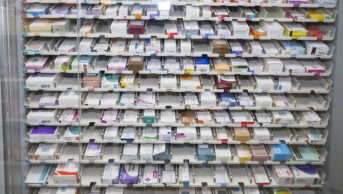
Shutterstock.com
Countries should consider requiring pharmaceutical companies to collect and destroy unused or expired medicines that they have put on the market, the Organisation for Economic Co-operation and Development (OECD) has said.
In its report ‘Management of pharmaceutical household waste: Limiting environmental impacts of unused or expired medicine‘, published on 10 May 2022, the OECD called for “policy interventions aimed at preventing and collecting unused medicines”, amid warnings that the amount of unused medicines that become household waste was increasing.
The report said the implications of the improper disposal of unused or expired medicines (UEM) include public health risks around misuse of medicines obtained from waste bins, the development of antimicrobial resistant bacteria from the discharge of antibiotics into environmental systems and “economic losses” from wasted healthcare resources.
The report comes after researchers detected “potentially harmful concentrations” of pharmaceuticals in more than a quarter of water samples taken from 258 rivers around the world.
To mitigate these issues, the OECD recommended countries consider collecting medicines separately from household waste and setting up “marketplaces and redistribution platforms for unused close-to-expiry-date medicines”.
“Where there is a risk that medicine disposed in mixed waste can leach or be misused, separate collection is recommended to reduce environmental and public health impacts,” the report says.
“Extended producer responsibility (EPR) schemes have shown to be an effective approach to organise environmentally sound separate collection and treatment.”
The report explains that EPR schemes require “pharmaceutical companies to collect and destroy unwanted pharmaceuticals that they have put on the market, [shifting] the economic and organisational burden of unused drugs collection and disposal from the government to the pharmaceutical industry”.
“As a result, EPR implements the ‘producer pays principle’, moving waste management costs from taxpayers to producers,” the report continues, adding that these types of schemes are already running in France, Spain and Portugal.
In France, where the report says 62% of all unused or expired medicines are returned to pharmacies for disposal, pharmaceutical companies “finance the collection and disposal of unused drugs from households and pharmacies act as collection points”, with all pharmacies required to participate in the scheme.
In contrast, data cited in the report show that, as of 2006, 22% of medicines in the UK were returned to pharmacies for disposal, 63% were discarded in household waste and 11% were emptied in the sink or toilet.
Additionally, the report recommends that “marketplaces for, and redistribution of, unused close-to-expiry date medicines can also improve the matching of supply and demand and prevent wastage”.
“Resale and re-dispensing of unused medicines is still a niche, due to concerns regarding counterfeits, quality assurance and consequent legal restraints, but a number of initiatives exist,” the report adds.
Parastou Donyai, professor of social and cognitive pharmacy at the University of Reading, told The Pharmaceutical Journal that medicines reuse is “currently not permitted within the UK, primarily because of uncertainty about the impact of storage conditions on the quality of medicines outside of formal care settings”.
But, as part of a research project at the university, she has “explored stakeholders’ perceptions of medicines reuse through qualitative research”.
“Our interview study showed people recognising the economic and environmental benefits of medicines reuse, indicating they would personally engage with such a scheme if their concerns around quality and safety of returned medicines as well as logistical processes were allayed,” she said.
“Our preliminary work shows that the key to enabling medicine reuse in the UK is the ability to validate the storage environment in which medicines have been kept within patients’ homes.
“Such a system would reassure patients and stakeholders about the quality and safety of returned medicines.
“Patient stockpiling at home may be exacerbating the recent medicine shortages in the UK and a proper reuse system could alleviate this problem, especially during national or international emergencies,” Donyai added.
A statement from the Medicines and Healthcare products Regulatory Agency (MHRA) said that, while there is a UK platform offering pharmacies and wholesalers the opportunity to sell medicines nearing their expiry date at a discounted price, UK regulations do not permit the supply of medicines collected from individuals for further supply to other patients.
It added that you need a wholesaler licence to sell or supply medicines to anyone other than the patient using the medicine.


